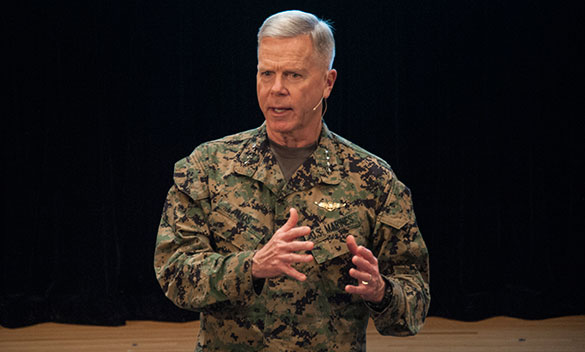by Thomas Zimmerman
Top Marine Corps officer shares insights, visions of future with USAWC students

Gen. James Amos, Commandant of the Marine Corps, adressed the Army War College Class of 2013 in Bliss Hall Dec. 18.
Dec. 18, 2012 – As recent events have shown a world undergoing dramatic shifts, the roles of the U.S. military services in a joint environment become even more important, according to the top officer in the Marine Corps.
Gen. James Amos, Commandant of the Marine Corps, spoke to the Army War College Class of 2013 in Bliss Hall Dec. 18 about the Marine Corps contribution to the Joint fight.
“Jointness is not a bureaucratic model. I believe in this,” he said. “Jointness is talking about the smooth integration of all our capabilities. We can’t do anything unless we work alongside of our partners.”
“We don’t have to be the lead. We’re part of the joint force. I really believe that,” he said. “As we go into these budget challenges we are going to need to make sure we weave that together so we are interdependent.”
“We have the unique ability, thanks to our expeditionary mindset and forward-deployed nature, to be at any time at any place and being a true joint partner enabler,” said Amos. “We don’t have a specific domain like the Air Force or the Navy. We truly are America’s crisis response force. America, Congress doesn’t buy the Marine Corps to be a second land army. We have the best Army, the best Air Force, and the best Navy in the world.
“With the Marine Corps you have a reasonably small force at a fairly high state of readiness, ready to respond to today’s crises today. We do it almost every day. It’s our lane.”
“The littorals are the connective tissue of the global order, connecting the maritime commons with the human population ashore,” he said. He pointed out that 21 of the 28 mega cities are within 62 miles of the sea, seven of the top 10 U.S. trading partners, 61 percent of the world’s population and that 95 percent of the world’s commerce moves by the sea in the Asia Pacific region.
Amos’s comments were directed at a joint and multinational 367-student body that includes 17 Marine Corps officers among the US military officers, 24 civilian leaders, and 71 international officers. He was clear about the Marine Corps value.
.”This is the kind of world we will all live in and need to work together to tackle these complex challenges,” he said. “The world is only becoming more complex but I am confident that we have the force necessary to tackle the challenges ahead.”
Leadership and working with our partners will be key as the focus of the military shifts to the Asia-Pacific region, he said, and noted the role of schools like the Army War College in developing the leaders needed for this changing environment.
“We cannot afford to stop playing a leadership role,” said Amos. “If we allow the world to just roll along and catch up later, someone else will step into fill that void and we may not like the results.”
“The concept of forward engagement and presence is something you should be discussing while you are here,” he said to the class. “You are into strategic thought. You are here to think at a level above the one you have been thinking at for the last couple of years where you have been narrowly focused and rightfully so.”
Amos reviewed the strategic benefit of forward deployment and engagement for the United States Underwrites security through a stabilizing presence
- Invests in the society of the global commons
- Influences actions of both threats and partners
- Builds trust that cannot be surged
- Allows proximity to emergent crisis
- Sets conditions for access in crisis
- Gives credibility to US security commitments



